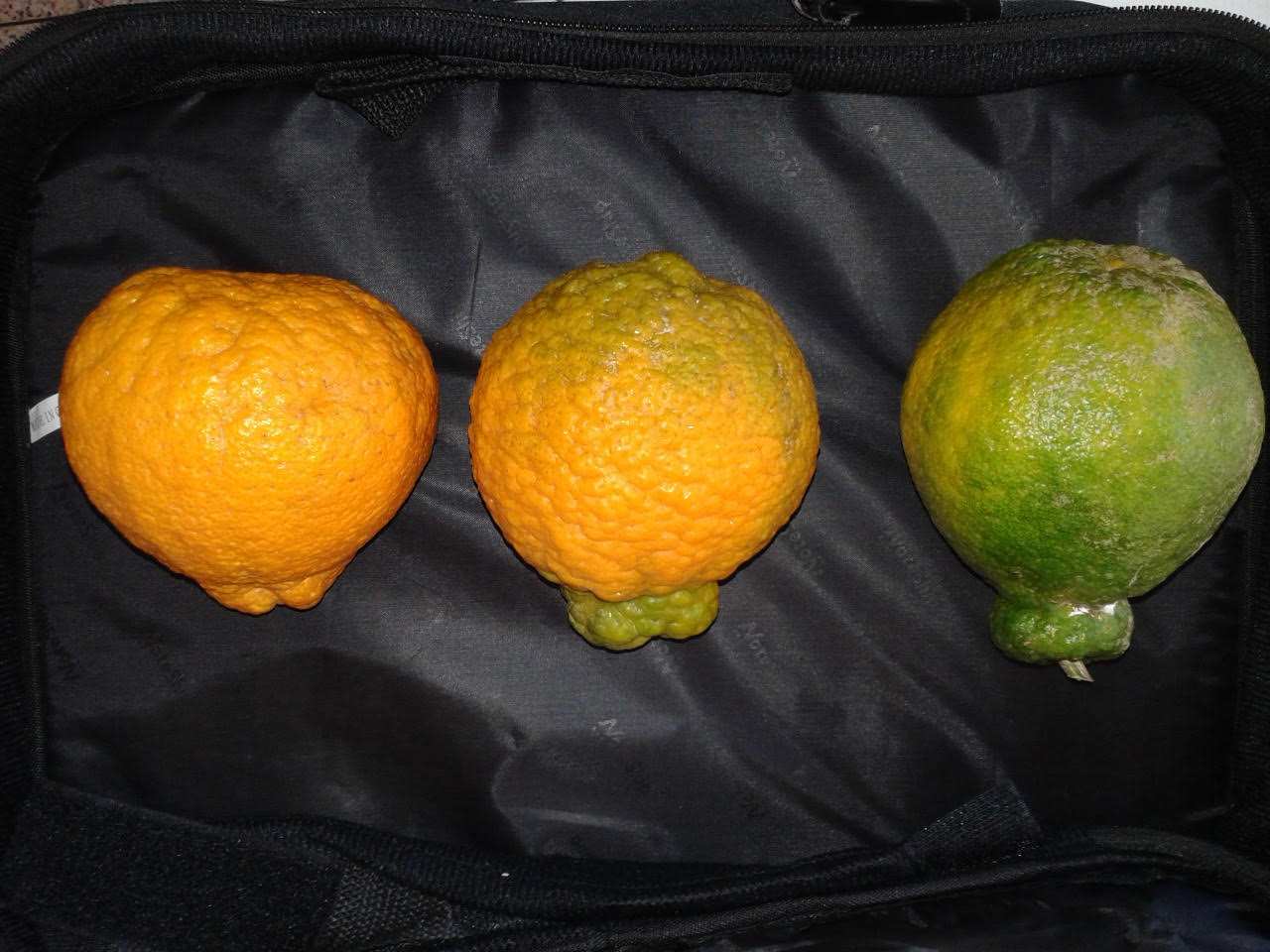Physicochemical and sensory characterization of ‘Dekopon’ fruits

Abstract
Dekopon is a seedless tangor of expressive size and its harvest is not the same as Ponkan’s, which has been the most commercialized cultivar. The aim of this study was to characterize physico-chemically and sensorially this tangor, through evaluations of soluble solids, acidity, ratio, vitamin C, diameter, peel thickness, firmness, juice volume and sensory impressions on taste, appearance, aroma, texture, overall impression and purchase intention. High levels of vitamin C and the volume of juice which correspond to about 50% of the weight of the fruit stood out regarding the chemical attributes. Most of the scores attributed to 'Dekopon' were above 6.0 and the ones of purchase intention were above 3.0. The fruit can be considered promising to be commercialized due to its good characteristics.
Keywords
Acceptance, Citrus reticulata 'Shiranui', Seedless fruits, Tangor, Ascorbic acid
References
Alcântara, R.I., Y.M.V. Camilo, W.N. Rodrigues, and T. Ogata. 2018. Caracterização pós-colheita de variedades de tangerina com potencial de produção e comercialização no Estado de Goiás. Rev. Agrar. 11, 319-323. Doi: https://doi.org/10.30612/agrarian.v11i42.7061
AOAC, Association Official Analytical Chemists. 2010. Official Methods of Analysis of AOAC International. 18th ed. Gaithersburg, MD.
Belo, A.P.M., C.M. Morgado, E.R.B. Souza, T. Ogata, C.C.O. Pereira, L.C. Cunha Junior. 2018. Comparative analysis, organic and characterization kind of Tangerine varietie. Sci. Hortic. 240, 102-108. Doi: https://doi.org/10.1016/j.scienta.2018.06.001
Calbo, A.G. and A.A. Nery. 1995. Medida de firmeza em hortaliças pela técnica de aplanação. Hortic. Bras. 3, 14-18.
Cao, J., C. Wang, S. Xu, Y. Chen, Y. Wang, X. Li, and C. Sun. 2019. The effects of transportation temperature on the decay rate and quality of postharvest Ponkan (Citrus reticulata Blanco) fruit in different storage periods. Sci. Hortic. 247, 42-48. Doi: https://doi.org/10.1016/j.scienta.2018.12.009
CEAGESP, Companhia de Entrepostos e Armazéns Gerais de São Paulo. 2011. Programa brasileiro para a melhoria dos padroes comerciais e embalagens de hortigrangeiros. Normas de classificação: Citros de mesa. Centro de Qualidade em Horticultura, Sao Paulo, Brazil.
Chitarra, M.I.F. and A.B. Chitarra. 2005. Pós-colheita de frutos e hortaliças: fisiologia e manuseio. 2nd ed. UFLA, Lavras, Brazil.
Faria, J.A., M.N. Lima, S.E. Araújo Neto, E.B.L. Oliveira, and R.L.F. Ferreira, 2019. Qualidade de frutos de abacate cv. Fuerte tratados com revestimento natural. Sci. Nat. 1, 35-44
Hair, J.R., R.E. Anderson, R.L. Tatham, and W.C. Black. 2005. Análise multivariada de dados. Buckman, Porto Alegre, Brazil.
Hunterlab. 1996. Applications note: CIE L* a* b* color scale. Reston, VA.
Kaiser, H.F. 1958. The varimax criterion for analytic rotation in factor analysis. Psychometrika 23, 187-200. Doi: https://doi.org/10.1007/BF02289233
Lado, J., G. Gambetta, and L. Zacaria. 2018. Key determinants of citrus fruit quality: Metabolites and main changes during maturation. Sci. Hortic. 233, 238-248. Doi: https://doi.org/10.1016/j.scienta.2018.01.055
Strohecker, R.L. and H.M. Henning. 1967. Analisis de vitaminas: métodos comprobados. Paz Montalvo, Madrid.
Taiz, L., E. Zeiger, I. Moller, and A. Murphy. 2017. Fisiologia e desenvolvimento vegetal. 6th ed. Artmed, Porto Alegre, Brazil.
USDA, United States Department of Agriculture. 2018. Citrus: world markets and trade. In: Foreign Agricultural Service, Washington, DC.
